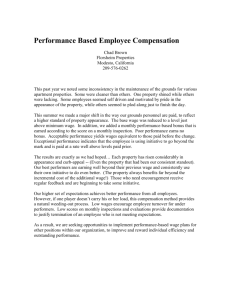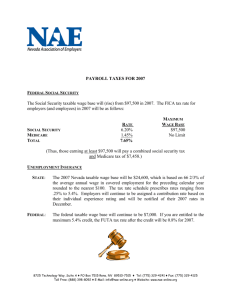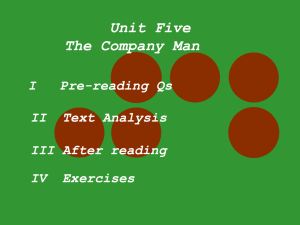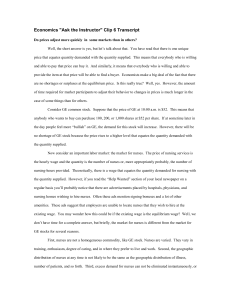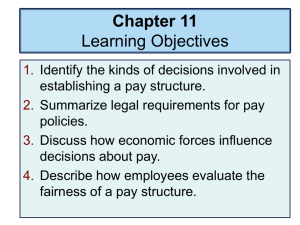Tyrée Johnson Professor Hunter English Composition II March 20
advertisement
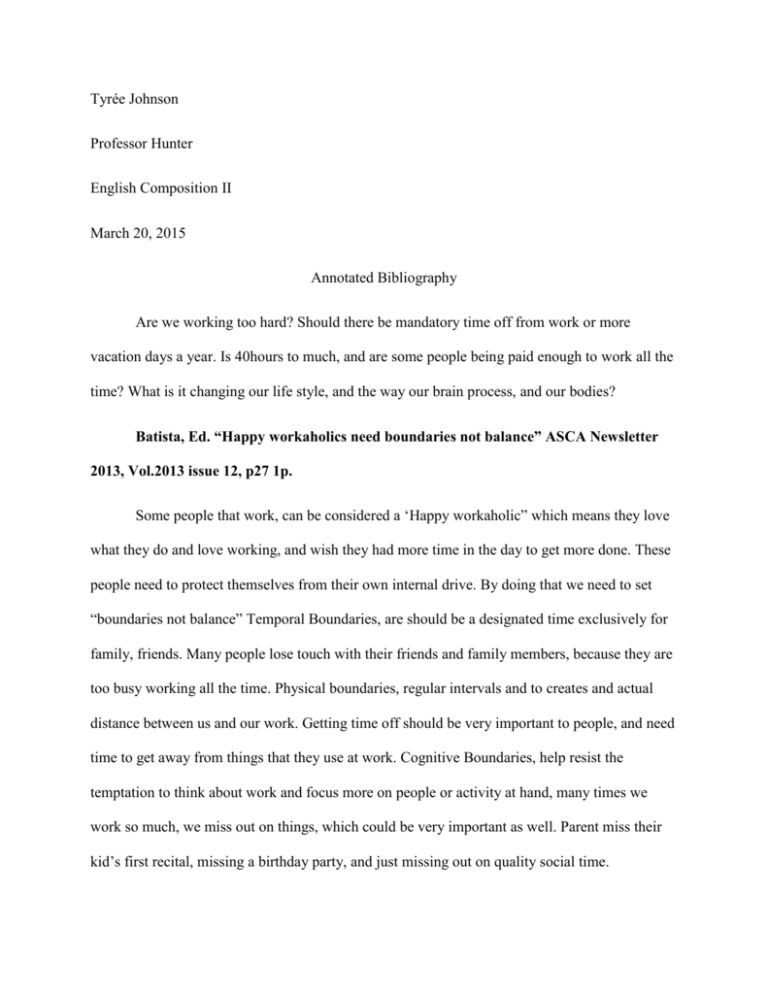
Tyrée Johnson Professor Hunter English Composition II March 20, 2015 Annotated Bibliography Are we working too hard? Should there be mandatory time off from work or more vacation days a year. Is 40hours to much, and are some people being paid enough to work all the time? What is it changing our life style, and the way our brain process, and our bodies? Batista, Ed. “Happy workaholics need boundaries not balance” ASCA Newsletter 2013, Vol.2013 issue 12, p27 1p. Some people that work, can be considered a ‘Happy workaholic” which means they love what they do and love working, and wish they had more time in the day to get more done. These people need to protect themselves from their own internal drive. By doing that we need to set “boundaries not balance” Temporal Boundaries, are should be a designated time exclusively for family, friends. Many people lose touch with their friends and family members, because they are too busy working all the time. Physical boundaries, regular intervals and to creates and actual distance between us and our work. Getting time off should be very important to people, and need time to get away from things that they use at work. Cognitive Boundaries, help resist the temptation to think about work and focus more on people or activity at hand, many times we work so much, we miss out on things, which could be very important as well. Parent miss their kid’s first recital, missing a birthday party, and just missing out on quality social time. I will use this article because it talks about how you can stop being a workaholic, and enjoy what life has to offer, this can turn my research into more of a persuasion so people will understand why I think people are working too hard, and what it is causing Berlatsky, Noah. “The Minimum Wage.” Detroit: Greenhaven, 2012 press. Opposing viewpoints 213 pages: illustration: 24 What impact does the minimum wage have on workers? And what impact does it have on the business and the economy? This book talks about the different way Minimum wage effects our lives, and our world. How minimum wage can affect how people are working too much in life, because some businesses aren’t providing enough to keep people stable. I will use this book because, it is a big part of my article, and why there should be more mandatory time off, people are having to work too hard, just to be able to put a little food on the table each night, and do not have time to relax which can cause bad psychological issues later in life, and effect your body in bad ways. Hui-Ju Chiu and Su-Fen Cheng. “Protecting the labor right of female nurses” The Journal of nursing Vol. 62 Issue. P5-9.5 p 2015 The gender equality in employment Act was enacted to protect gender equality in the workplace. Nurses Pose major challenges to the labor rights of female nurses. This article introduces the labor rights of female nurses as stated in relevant laws and regulations. This article is great for the government side, and how they play a role in workholism, and what they are doing to prevent it, if any at all. It gives real examples of a profession the works harder than doctors at times, nurses, and the job that runs the hospital. Sabia. “The Effects of Minimum Wages over the Business Cycle.” Journal of Labor Research Sep 2014, Vol. 35 Issue 3 p227 19p A review on the minimum wage, with credible studies, on the low-skilled employment effects of minimum wage increases point to a return to the “old consensus.” This was published by 2012 journal of labor research, people who did surveys, and research across each border and the different minimum wages. The information in this article will be a big part, because it still deals with minimum wage and government on how they decide the minimum wage. Salanova, Marisa, Mario Del Libano, Susana Llorens, and Wilmar B. Shaufeli. “Engaged, Workaholic, Burned-Out or Just 9-to-5? Toward a Typology of Employee Wellbeing.” Feb 2014, Vol. 30 Issue 1, p71 11p. Employee well-being is a traditional core issue for job stress and occupational health research. The main objective of this study is to integrate three different approaches to well-being at work. The affective approach which distinguishes between arousal and pleasure, The Cognitive approach which is based on the balance between skills and challenges, and the affective-cognitive approach which distinguishes two dimensions: energy and identification. In the Affective Approach is about the bipolar affective occupational stress can cause. It can cause happiness or unhappiness. They can be very enthusiastic or tense about work. In the Cognitive Approach is about the how people are involved with work, employees are likely to experience flow when their challenges at work match their professional skills at a high level but this can also cause boredom when an employee’s skills exceed their job challenges. Which can employees to feel overwhelmed and anxious. And the affective-cognitive approach there are four types of employee well-being exist: 1. Relaxed 2. Enthusiastic 3. Tense 4. Fatigued. This is a great book, because it talks about the psychological approach to workaholics, and what it cause our emotions and feelings and pleasures to turn into and how we develop these in the occupational world. Solet, Jo M. “Dangerously Sleepy” The journal of interdisciplinary history. (MIT Press Journals)Winter 2015, Vol. 45 issue 3, 443-445 Humans are over worked all across the world, not getting a enough time off, and can affect the brains rhythms to predict sleep stability. This article is good source, because it examines how the brain is effected and your body because you work too hard Tranca, Loredana-Marcela, and Patricia-Luciana Runcan. “Communication and Conflict in workaholics families” Social Work Review. Issue 2, p113-123. 11p The current research approaching the issue of communication and conflict in workaholics’ families relies on the incidence of the phenomenon, on its complexity and its implications in the range of psychosocial functioning on the family system. This article is useful, because it talks about how the workforce, can change the way you socialize to other people, even close ones like your family. It talks about the psychological approach it also describes what a workaholic behavior is, which could really tell you if you’re one yourself.




